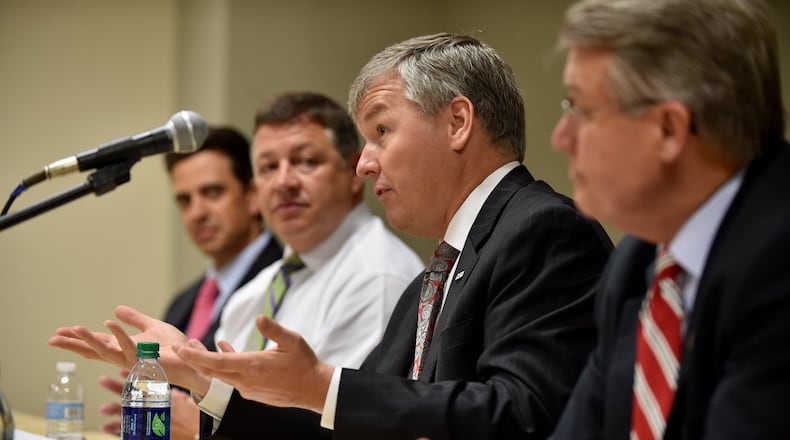Same campus. Same faces. Same thorny issue.
But more of the same is exactly what U.S. Rep. Bill Shuster, R-Pa., and several members of the Georgia congressional delegation were urged to avoid Tuesday when it comes to passing — or in this case, failing to pass — a long-term transportation bill.
At a Georgia Institute of Technology roundtable discussion, Shuster, chairman of the House Transportation and Infrastructure Committee, heard pleas for investment from state transportation officials and corporate giants UPS and Coca-Cola, who rely on the nation’s network of highways to move goods.
The forum was a repeat performance in many ways for Shuster, who visited the campus in September 2013 for a discussion about the nation’s severely backlogged transportation and infrastructure needs. No bill to meet those long-term needs has emerged since then.
“The condition of our system has been deteriorating greatly over the last couple decades,” Meg Pirkle, the chief engineer for the Georgia Department of Transportation, told the panel. “The money we received this year from our state Legislature is pretty much a Band-Aid on an open wound. We have to have consistent, reliable transportation funding.”
Congress is trying to find a way to keep money flowing into the highway trust fund, the primary source of federal aid for major transportation projects. The fund is supported by the national fuel tax. But its revenues are dwindling because Americans are driving more fuel efficient vehicles.
The fund has repeatedly approached the brink of insolvency, prompting Congress to transfer money from the general fund and other sources to prop it up. A two-month extension that passed at the end of May was the 13th in a series of short-term extensions of transportation funding authority since 2009.
Shuster said he wants a six-year funding bill that will eliminate some onerous federal regulations that states complain about.
Where the money would come from remains uncertain. Shuster told reporters that a hike in the federal motor fuel tax (18.4 cents per gallon for gasoline, 24.4 cents per gallon for diesel) is off the table.
Shuster has said the funding could come from tax reform. However, this week Senate Majority Leader Mitch McConnell told Morning Consult — a digital politics, policy and polling media outlet — that a major tax code overhaul will not be on this year’s agenda.
Even so, Shuster said “there are a number of options out there.” Most viable is probably the idea of “repatriation,” requiring companies with investments overseas to return the money to the United States, he said.
“I like any idea that will fund the transportation system that is passable, that’s possible,” Shuster said.
According to the U.S. Department of Transportation, 65 percent of roads are in less than good condition, one in four bridges are in need of replacement and public transit faces a repair backlog of $86 billion.
U.S. Reps. Tom Graves, Rob Woodall and Rick Allen, members of Georgia’s Republican congressional delegation, joined Shuster at the roundtable.
Allen, R-Evans, said he got a taste of Atlanta traffic woes while on this trip. A drive that should have taken two and a half hours turned into a four-hour ordeal Monday night because of traffic near I-285. And Tuesday morning, on the way to the campus forum, it took 20 minutes to travel one block near I-75, Allen said.
Georgia lawmakers voted this year to nearly double the amount the state spends on transportation by adding a higher tax on motor fuel, nixing tax credits for jet fuel and electric vehicles, and imposing new fees on heavy trucks, electric vehicles and hotel stays. But even after the law takes effect on July 1, the state will still rely on the federal government for roughly a third of its transportation budget.
Georgia has shelved 100 transportation projects totaling $447 million because of the federal funding uncertainty.
At the conclusion of the discussion, Alice Grossman introduced herself to Shuster and the rest of the panel as a doctoral student from Georgia Tech who is focused on transportation policy.
“So you’re going to build those roadways of the future?” Shuster asked.
Grossman quipped, “If there’s funding for it, yes.”
About the Author
Keep Reading
The Latest
Featured



